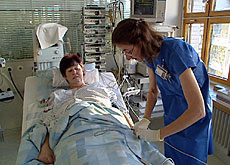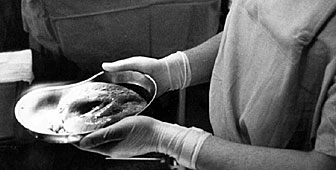Organ transplants to get boost by new law

Switzerland has one of the lowest rates of organ donation in Europe and is the last country on the continent to set rules on organ transplantation.
On Wednesday the Senate agreed to a series of legal measures which could help encourage people to donate their organs when they die.
The law aims to regulate transplant medicine, including measures to prevent all forms of abuse.
The other parliamentary chamber, the House of Representatives, debated the issue last December. Some differences between the two Houses have still to be settled.
Switzerland is alone in Europe in not having a set of regulations governing transplantation medicine.
Theodor Weber of the Federal Health Office says that guidelines are needed to improve transplant safety and ensure that no potential organ recipient is discriminated against.
Awareness
“Bringing in a law would result in more awareness and more legal safety in transplantation medicine, and this could lead to more confidence in this technology,” Weber says.
Experts point to the example of Germany, which introduced a similar law in 1997. As well as giving transplantation medicine a higher profile, the law led to a slight rise in the number of organ donations.
But the Swiss law is not specifically designed to increase the number of organ donors. Weber argues it is not up to the state to interfere in a very personal matter.
But he says the federal authorities plan to provide objective information about organ transplants, which in turn could result in more donations.
Lack of donors
Switzerland is fourth from the bottom in terms of organ donations compared with other European countries. Last year, only 13 out of a million were donors in Switzerland.
“It is a fact that we have fewer potential donors. But I don’t think people in Switzerland are more sceptical than elsewhere when it comes to organ donation,” Weber told swissinfo.
One of the reasons for the low rate of donations in Switzerland, Weber says, is that there are fewer road victims than in other countries thanks to stricter safety measures and better roads.
“Another factor is that fewer people die as a result of high-tech medicine,” he added.
But he says the ratio of donations to donor cards is very similar to that in other countries.
Measures
Last year 1,209 people, including 37 children, were on a waiting list, but only 491 received an organ transplant. Fifty-five people died before they could receive a healthy organ, according to a survey.
This is reason enough for the national transplant coordination centre, Swisstransplant, to demand additional efforts to win potential donors.
Trix Heberlein, a parliamentarian for Zurich and president of Swisstransplant, has called for a campaign to raise awareness among learner drivers of the need for donations.
She told the “TagesAnzeiger” newspaper that she would also approve a special entry on the driving licences of potential organ donors.
Other proposals include better training for nurses and doctors.
Weber believes it is crucial that hospital staff are instructed to identify possible organ donors in intensive care units and that they address the issue with patients’ relatives.
Organ donor day
Over the past eight years the national transplant coordination centre has organised an annual day to encourage more potential donors to come forward.
Swisstransplant’s Britta Johnson says the national day is just part of the coordination centre’s campaigning efforts.
“We rely on the cooperation of our partners in the health sector to increase coordination in transplant medicine. We are also present at major exhibitions and trade fairs to get our voice heard,” Johnson told swissinfo.
Geneva-based Swisstransplant was also behind European campaigns in 1996 and 1998 to raise public awareness of the issue.
In April, the dire need for organs for transplant was highlighted by a bungled operation in which a patient died after being given a heart incompatible with her blood group. The revelation prompted a wave of requests from the public for information and donor forms.
swissinfo, Urs Geiser
The Swiss Senate has discussed a new law, which could help raise awareness of organ transplants and prevent the trade in organs and other forms of abuse.
The other parliamentary chamber, the House of Representatives, approved the measures in principle last December.
In 1999, Swiss voters approved an article in the constitution calling on the government to set rules on the transplantation of organs, tissue and cells.
Switzerland ranks fourth from bottom when it comes to organ donation in Europe.
Last year, just 13.2 people out of every million Swiss were donors, according to a survey.
In 2003, 1,209 people were on a waiting list, but only 491 received a transplant. Fifty-five people died while on the waiting list.
Over the past 15 years 4,989 organs have been transplanted in Switzerland, including 3,394 kidneys, 664 livers, 595 hearts and 190 lungs.

In compliance with the JTI standards
More: SWI swissinfo.ch certified by the Journalism Trust Initiative












You can find an overview of ongoing debates with our journalists here . Please join us!
If you want to start a conversation about a topic raised in this article or want to report factual errors, email us at english@swissinfo.ch.